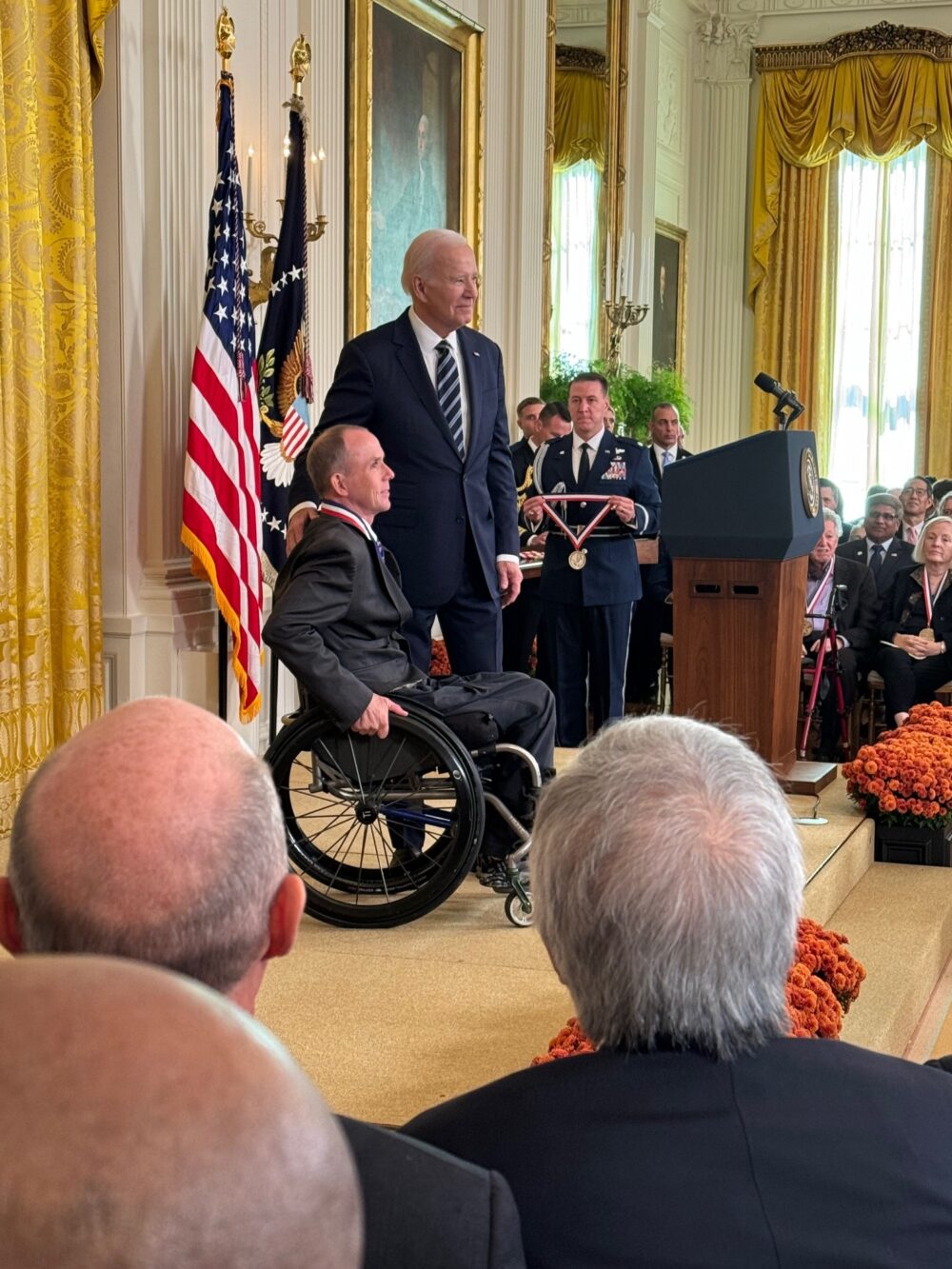Individuals requiring assistive technology tend to be an underserved group, but as a wheelchair user himself, University of Pittsburgh’s Rory Cooper wasn’t content to simply hope more options sprang into being. Instead, he became an inventor and mentored other disabled inventors who’d make their share of assistive tech contributions.
In late October, Cooper traveled to the White House to receive the National Medal of Technology and Innovation for his work in the field. Receiving the award, which was launched in 1985, put Cooper and his fellow honorees in the company of Apple’s Steve Jobs, Steve Wozniak and other tech giants.
Cooper is Pitt’s assistant vice chancellor for research for STEM-health sciences collaborations, as well as the founding director and VA senior research career scientist of the Human Engineering Research Laboratories. When he came to the Steel City from California after being recruited by Pitt in 1993, he and his wife felt like it’d be a good place for a fresh start. Looking back now, the 63-year-old, Gibsonia-based Cooper said he’s never regretted making the Pittsburgh area his new home.
Here’s a look at how Cooper went from a nuclear power plant to making contributions to the assistive technology sector that even the White House found impressive. This Q&A has been edited for length and clarity.
Where did your interest in assistive technology come from?
Rory Cooper: It came out of personal need. After I started using a wheelchair due to a spinal cord injury, I discovered that the technology just over 40 years ago was not very good. And so I started developing technology for myself. And then, as I advanced in college, I learned that I was not the only one in need of better technology. And so that led to eventually creating the Human Engineering Research Laboratories.
What are some of the biggest challenges you’ve had throughout your career?
Obviously, securing funding is always one of the challenges for anybody in a research career. The other biggest challenges are addressing some of the complex needs of people with disabilities in order to create a society that’s more inclusive and accessible to them. So we’ve tackled some pretty significant challenges, such as reducing the risk of carpal tunnel syndrome of elbow tendonitis, but rotator cuff injuries. We’re just seeing incidents of pressure injuries or pressure sores, pelagic expanded mobility, and then access to higher-quality devices.
What was your first tech job?
My first tech job was as an engineer at Pacific Gas and Electric at their Diablo Canyon Nuclear Power Plant. It was a unique opportunity because I was part of the last phase of studying to provide commercial power. And so I got to see sort of the last phases of bringing the plant online and all the processes that it takes, and I had the opportunity to train some of the operators as well. So it’s a really interesting job — and it’s actually the job that led me to think about teaching as a career and pursuing my Ph.D., which then introduced me to biomedical engineering.
Now, of course, as a person with a disability who uses a wheelchair, getting that first job was really important, just to show, to prove to myself and to others that I could work and contribute.
How would you describe the work environment at the University of Pittsburgh?
It’s good, it’s inclusive, and we’re working to make it more so. We came to the University of Pittsburgh at a pretty exciting time in the 1990s [in] Pittsburgh when it just started to recover from the loss of the steel industry and automotive industry and transition to a high-tech economy. And it’s been remarkable to see that the University of Pittsburgh was a big part of that as the other universities in the area, and working with city, county, and in districts of nonprofits here. So it’s been exciting to see that transformation and to be part of that transformation.
And, and I think we’re still in it. I think we are pretty influential in both the robotics fields [and] in the medical fields. And so, it’s kind of an exciting place to be.
What are some of the things that you’ve accomplished throughout your career that you feel particularly proud of?
I’m most proud of creating the Human Engineering Research Laboratories itself, [which] I basically created with two graduate students from scratch 30 years ago. The other things I’m most proud of are actually, the people that we’ve trained who’ve gone out across the United States and around the globe, to further develop and apply assistive technology for people with disabilities to improve mobility and function in society.
The things I’m most proud of are the contributions that people with disabilities themselves have made through working with HERL or using the technology roles created.







